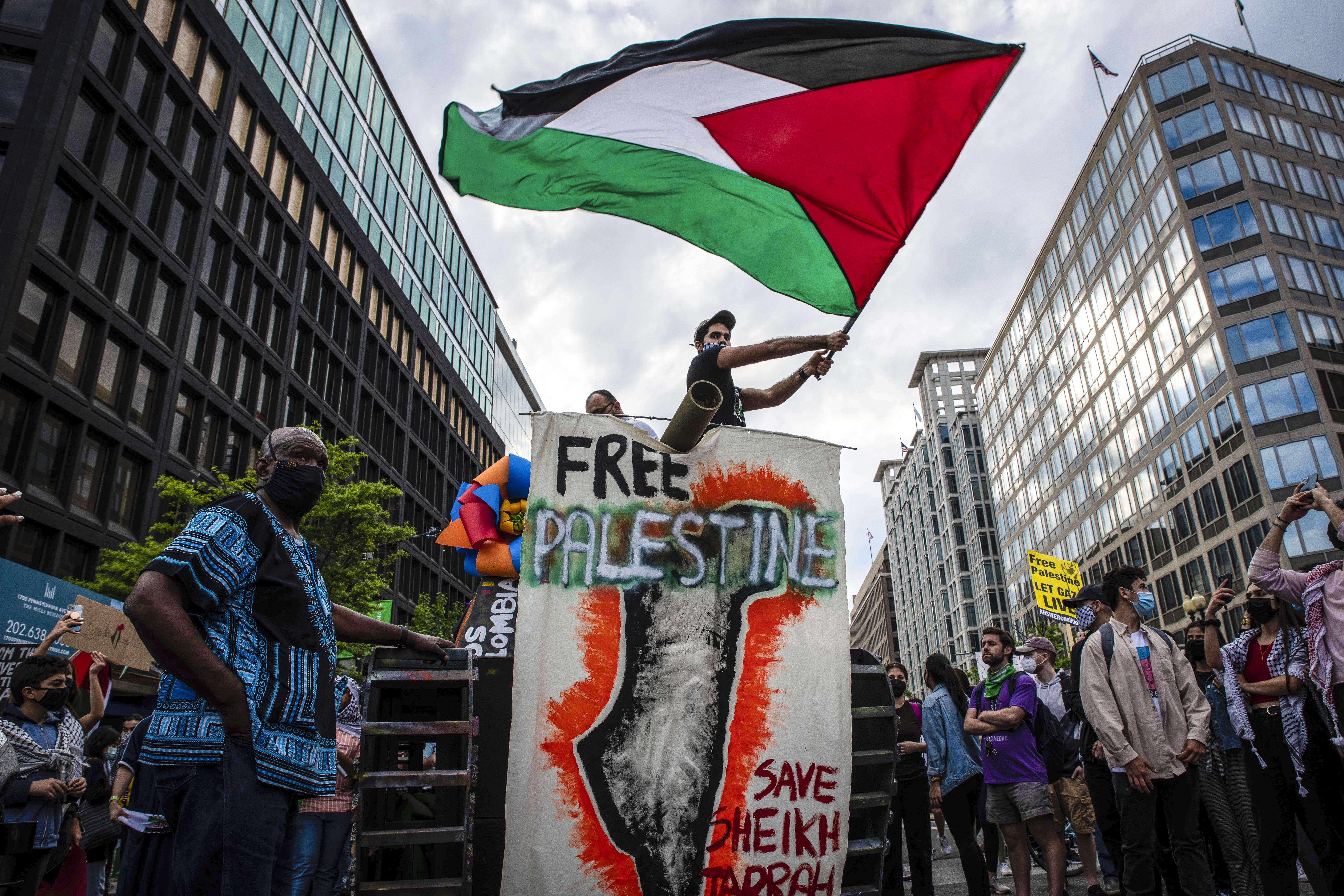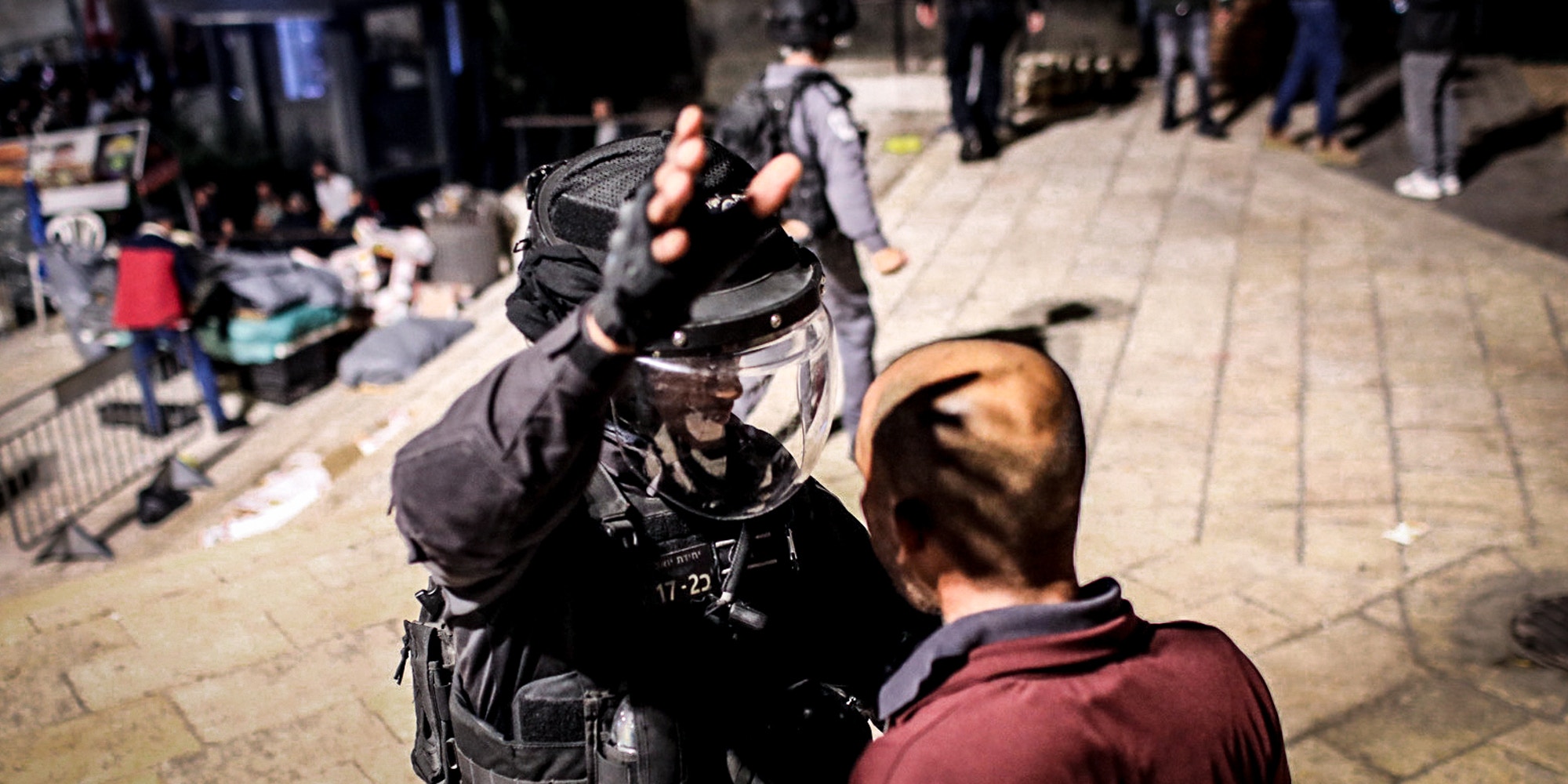MOHAMMED EL-KURD, a Palestinian from the East Jerusalem neighborhood of Sheikh Jarrah, was on national U.S. television several times last week. After appearing on CNN, MSNBC, and “Democracy Now!,” El-Kurd was accosted by Israeli soldiers and forced out of his neighborhood. The dramatic video ricocheted around the internet.
On Thursday, El-Kurd was back on U.S. television. “Thank God for social media,” he told “Democracy Now!,” “because it appears to me that the world is finally waking up to the fact that Israel is an apartheid state and it treats Palestinians with such dehumanization.”
El-Kurd is only 23 years old, but he is already burdened by history. El-Kurd was a preteen when his family, like others in the enclave near the ancient Old City, began fighting expulsion from their home, to make way for Jewish settlers — backed by the state of Israel.
El-Kurd’s plight began long before he was born. His grandmother, Rifqa El-Kurd, was forced to leave her home in Haifa in 1948, as part of the mass expulsions that accompanied the creation of Israel, events Palestinians refer to as the Nakba, or catastrophe. She eventually settled in Sheikh Jarrah. The neighborhood had been established as a Palestinian one following the 1948 Arab-Israeli War, but in 1967’s Six-Day War, Israel seized East Jerusalem, the West Bank, and Gaza by force — inaugurating what has been more than a half-century of the continuing dispossession, a legal system bifurcated on ethnic lines, and frequent violence known as the occupation.
In 2009, Israeli settlers took over half of the El-Kurd home, claiming in court that the house was built on land owned by Jews before they fled the 1948 war.
“It’s bizarre to describe to people that there is a settler that has taken over half of my home and has been living there for the past 12 years — that there is a settler organization registered in the U.S. that is working tirelessly to dispossess me and my family and other people from the neighborhood,” El-Kurd told me in an interview before his removal from Sheikh Jarrah. Nahalat Shimon, the Israeli settler organization trying to force his family out, is owned by a firm registered in Delaware, where corporate laws give its owners anonymity.
Escalations in the past week came quickly — Israeli raids on Al Aqsa Mosque, rockets fired from Gaza, with a response of severe airstrikes and bombardment — but Sheikh Jarrah is at the heart of this round of violence. The area, which stretches over a small hill and is dotted with diplomatic missions and United Nations and NGO offices, has been a flashpoint for years, as Israelis looked to move into Palestinian homes in Jerusalem under Israel’s absentee property law. It was an act, some Palestinians say, tantamount to an “ongoing Nakba” — based on the continuing iniquities foisted on Palestinians more than seven decades ago.
UNDER ISRAELI LAW, Palestinian Jerusalemites whose houses were taken in 1948 are deemed “absentees” and have no legal claim to their property, but Jewish citizens of Israel who can prove that a house was owned by a Jewish person do have recourse. It needn’t even be the Jewish family that owned the home, meaning that powerful, well-funded settler organizations with ties abroad can also claim the properties. This legal disparity is the auspices under which the impending evictions are being carried out.
“The difference with the Nakba today is that Israeli authorities were able to replace weapons and artillery with a judicial system that was built,” said El-Kurd, “to ensure a Jewish dominance in Jerusalem. What that translates to is forced displacement and dispossession.”
Settlers regularly target homes in the city’s Palestinian neighborhoods, using the absentee property law — and, frequently, spurious documentation — to forcibly evict residents. The homes get taken over in an apparent effort to establish Jewish enclaves, complicating any partition of the city in a future peace deal.
These events are in the context of what Israeli rights group B’Tselem calls “Israel’s attempts to shape the demographic reality of East Jerusalem … through land expropriation and building restrictions,” according to the group’s website. “While the Jewish neighborhoods of Jerusalem and the settlement blocs on its outskirts enjoy massive development and substantial funding, Israel goes to great lengths to prevent development in Palestinian areas” — including its laws and policies currently playing out in Sheikh Jarrah.
Both B’Tselem and New York-based Human Rights Watch recently pointed to Israeli policies as examples of apartheid — something that would have been unheard of from mainstream liberal institutions even a few years ago.
“It’s remarkable that a term like Nakba, that discussion of issues like settler colonialism and what Zionism really means are finally entering global, and especially American Western, public discourse,” said Rashid Khalidi, a Palestinian historian and professor at Columbia University. “It’s a sign of the beginning of the shifting tectonic plates that have always been in favor of Zionism in Israel in the past.”

A “Save Sheikh Jarrah” demonstrator waves a Palestinian flag atop a mock wooden tank near the White House on May 11, 2021, in Washington, D.C.
THE PRO-ISRAEL political elite is pushing back furiously against the movement in liberal opinion, but stories like those unfolding in Jerusalem stand to prove the human rights groups right. The threat to evict Palestinians from the neighborhood of Sheikh Jarrah and surrounding clashes, broadcast on social media, is laying bare a system of segregation based on ethnicity — reinforcing the apartheid label.
“It’s been fascinating to see the different responses here from elected officials in the U.S.,” said Yousef Munayyer, a nonresident senior fellow at the Arab Center Washington DC, a research institute. “There are clearly shifts, and people who have not spoken out before are speaking out now, and those who have spoken on these issues before are shifting their tone.” He added that people were “recognizing that a blank-check-for-Israel approach, which has long been the standard here in the U.S., is not politically safe anymore.”
With a lag, shifts in popular opinion are beginning to surface in what was once an impenetrable fortress of orthodox pro-Israel sentiment: Congress. Lawmakers, particularly newer Democrats seizing on the energy of younger voters, took the House floor on Thursday to speak out against Israel’s policies.
“There are dozens of congressmen who have come out in favor of bills that would halt American support for Israel’s demolition of Palestinian homes or halt Israel’s detention of Palestinian children,” Khalidi said. “We’re at the beginning of a change, and I’m hoping it will lead to real action by international actors and not just meaningless bleating of condemnations.”
On May 9, Israel’s Supreme Court announced that it was postponing a ruling on the decades-old case to evict the Palestinian families, with hearing set to reconvene in a month. El-Kurd and his fellow activists aren’t deterred by the impending decision.
“We are amazed by the international grassroots and local and regional organizational support for our campaign, and we’re also amazed by the developments on the ground,” El-Kurd said. “In the next 30 days, we are going to double our efforts. This is a movement that is never going to stop until we get what we want.”
Source: Intercept



























